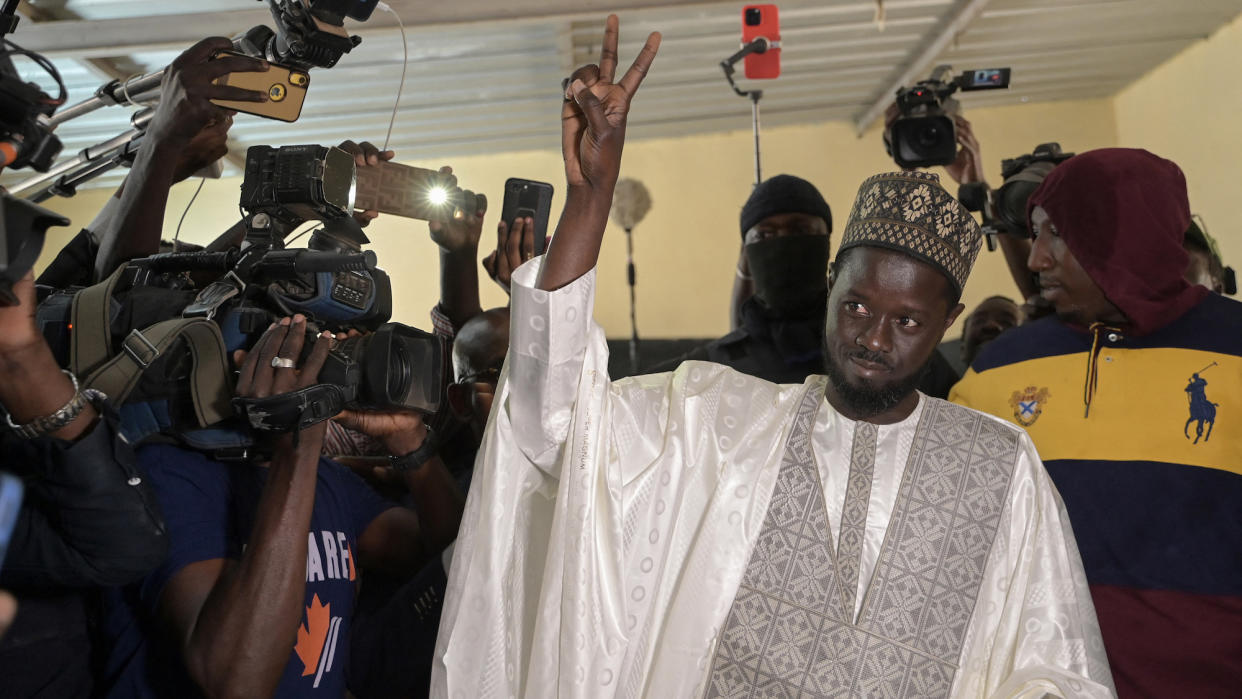Senegal's Bassirou Diomaye Faye: from prison to Africa's youngest elected leader

- Oops!Something went wrong.Please try again later.
- Oops!Something went wrong.Please try again later.
Just weeks after being released from jail, Bassirou Diomaye Faye is set to become Senegal's youngest ever president following an extraordinary election victory.
The meteoric rise of The 44-year-old former tax inspector – who was arrested last year on charges of defamation and contempt of court – was made possible when the leader of his opposition coalition, Ousmane Sonko, was barred from standing in the election after being convicted of defamation and accused of rape.
Faye's main opponent, Amadou Ba, conceded defeat on Monday after "provisional results showed Faye had won nearly 54% of the vote", said DW. Ba won 32%. It is an "unlikely climb to the top for an unlikely national figurehead", said Reuters. Faye will replace Macky Sall as president when his second term in office ends on 2 April.
'Soft-spoken and serious'
Faye has emerged from the shadow of "popular and controversial opposition politician" Ousmane Sonko, said The New York Times. Both have "captivated young people" by "excoriating political elites" and promising economic reforms.
But Faye has been pushed into the limelight since Sonko was barred from standing in the election, and many voters saw him "merely as a proxy". The two men have "very different styles", however. In contrast to Sonko's "bombast", Faye is described as "soft-spoken and serious".
Faye has "made little secret" on the campaign trail of his closeness to Sonko, said the Financial Times. But Faye has been credited as being the "strategist" in his party – La Coalition Diomaye Président, an alliance of opposition groups formed following the dissolution of his party Pastef after Sonko's arrest.
An amnesty law passed last month made it possible for Faye to stand in the election. He was arrested last April on charges of "spreading false news, contempt of court and defamation of a constituted body", said Al Jazeera, after criticising the government in a Facebook post.
'Agent of change'
Senegal is often "lauded as one of Africa's most stable democracies" and usually experiences fairly peaceful transitions of power. But the country appears to be on the "brink of a generational shift", said Alexis Akwagyiram on Semafor. There is hope that Faye's "rapid ascent and relative youth" could genuinely make him an "agent of change" on a "continent dominated by elderly leaders".
A "lack of job opportunities" in Senegal has led many young people "desperate for a brighter future" to try to reach Europe in small boats. Faye has vowed to "shake up the established order" and wants to generate greater economic prosperity through policies such as "currency change and renegotiating oil and gas contracts". Senegal's currency is currently pegged to the euro and backed by the French treasury.
Supporters of the former government have warned of "potential fiscal mismanagement" under Faye, said the FT, but his policies are likely to "gravitate towards the centre". That could be affected by Sonko having a presence "assisting in the daily running of the country", added DW, and he could become "actively involved in the next government, either as prime minister or in a similar position".

